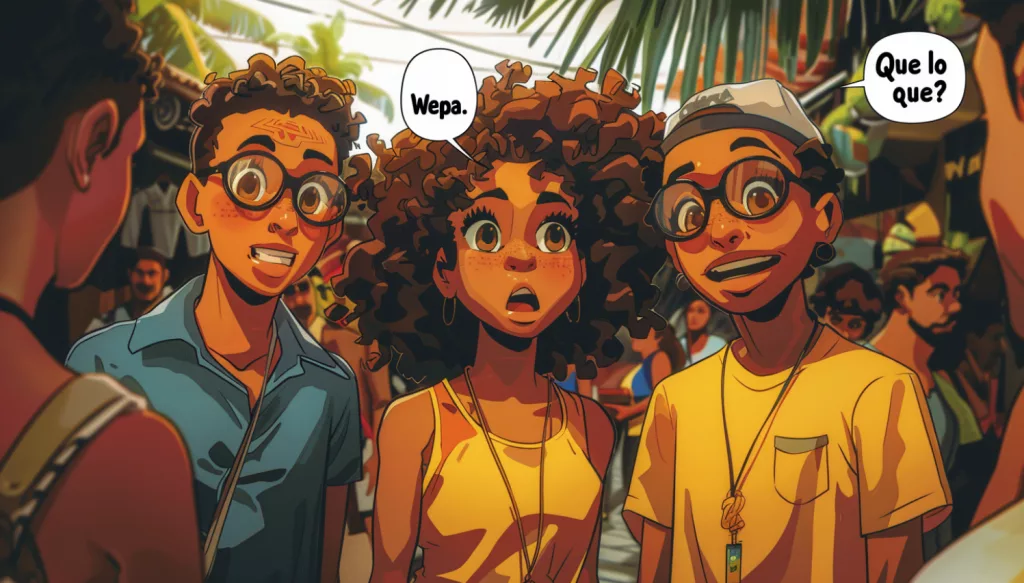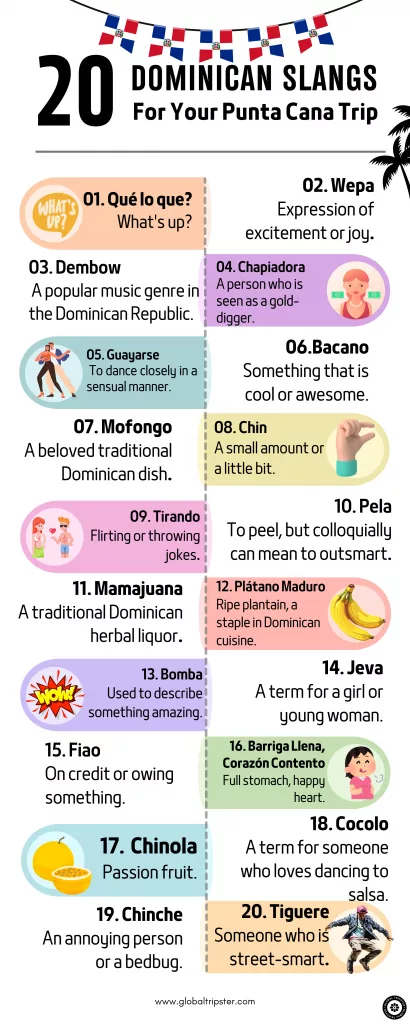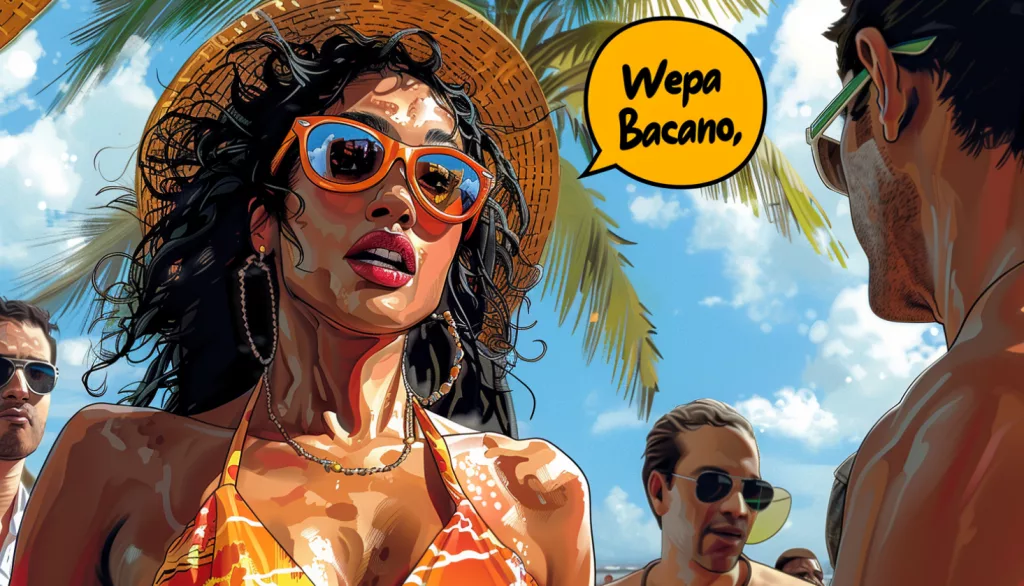Punta Cana in Dominican Republic is the destination you are looking for? When you are ready to go, make sure that you have become familiar with some Dominican slang words which are usually used. Learning a local language can improve your trip perception as you get involved in the lively culture of Dominican Republic.
In this article, we will look at 20 essential Dominican slang words, so that you will be able to go ahead to Punta Cana and say such phrases as “Qué lo que?” or “Barriga Llena, Corazón Contento.” No delay, then we get down to business!
What Is Dominican Slang?
Dominican slang refers to the unique set of colloquial expressions, terms, and phrases used by locals in the Dominican Republic, reflecting the vibrant and diverse culture of the Caribbean nation.
This form of slang holds immense significance in local communication as it not only acts as a means of everyday conversation but also serves as a symbolic representation of Dominican identity.
Through the use of slang, Dominicans are able to add layers of nuance, humor, and familiarity to their conversations, making interactions more lively and culturally rich.
Understanding Dominican slang is key to immersing oneself in the vibrant tapestry of Dominican culture, as it provides insights into the values, experiences, and humor that define the local way of life.
Slang often diverges from standard language usage by incorporating unique vocabulary, expressions, and grammatical structures that reflect the dynamic evolution of language within the Dominican context.
Why Is It Important to Know Dominican Slang Before Visiting Punta Cana?
Understanding Dominican slang before visiting Punta Cana is crucial for travelers seeking an authentic Caribbean experience, as it facilitates communication, bridges potential language barriers, and enables meaningful interactions with locals.
By delving into the local slang expressions, tourists can delve deeper into the vibrant culture of the Dominican Republic. This not only helps in understanding the nuances of daily life but also opens up doors to unique experiences that may not be accessible otherwise.
Being able to communicate effectively in the local slang not only aids in navigating daily activities with ease but also fosters a sense of connection and camaraderie with the residents. It is through these authentic interactions that travelers can truly immerse themselves in the rich tapestry of Dominican life and create lasting memories.
What Are Some Commonly Used Dominican Slang Terms?
Dominican slang encompasses a rich array of commonly used terms and expressions that capture the essence of local culture, providing insight into the linguistic nuances and informal language practices of the Dominican people.
These slang terms often originate from historical events, cultural influences, or everyday interactions within Dominican society.
For example, the term ‘dembow‘ refers to a popular music genre characterized by its fast-paced rhythm and energetic beats, reflecting the vibrant and lively spirit of Dominican music.
Another common slang term is ‘tiguere,’ used to describe someone who is street-smart, resourceful, and savvy in navigating different situations.
Understanding these slang expressions not only enhances language proficiency but also fosters a deeper connection with Dominican culture and people.
1. “Qué lo que?”
The phrase ‘Qué lo que?‘ is a common Dominican greeting that translates to ‘What’s up?‘ and serves as a friendly and informal way to initiate conversations or interact with Dominicans and locals in a casual setting.
It is a versatile phrase that can be used in various situations, such as when meeting up with friends, starting a phone call, or even as a way to break the ice with strangers.
The phrase carries a sense of warmth and camaraderie, inviting a sense of familiarity and closeness even in initial interactions.
In the Dominican Republic, using ‘Qué lo que?‘ showcases a relaxed and down-to-earth communication style that reflects the country’s laid-back culture and sometimes it is accompanied by Dime ab! which means tell me about it, and it goes like: Dime ab! Que lo que?
Understanding the nuances of informal communication, like using this phrase, is key to forming genuine connections and blending in seamlessly in Dominican social settings.
2. “Wepa”
The expression ‘Wepa‘ is a popular exclamation in Dominican slang, used to express excitement, approval, or acknowledgment, often in social settings or when engaging in lively conversations with locals.
Its roots in Afro-Dominican culture reflect the vibrant spirit and joy of the Dominican people. The versatile nature of ‘Wepa‘ allows it to convey a range of emotions, from jubilation at a party to simply acknowledging someone’s statement. In social interactions, saying ‘Wepa‘ creates a shared sense of enthusiasm and camaraderie among speakers. For example, after hearing an impressive story or seeing a breathtaking dance performance, one might enthusiastically exclaim ‘Wepa!’ to show appreciation. Using ‘Wepa‘ authentically involves embracing the spontaneity and energy of Dominican conversations.
3. “Tiguere”
The term ‘Tiguere‘ in Dominican slang refers to a street-smart, cunning, or resourceful individual, embodying a mix of charisma, confidence, and streetwise skills, often used to describe someone with a certain edge or savvy attitude.
These individuals are often admired for their ability to navigate the complexities of urban life with style and swagger. Being a ‘Tiguere‘ is about more than just appearance; it’s a mindset that exudes resilience and adaptability.
In local conversations, the term ‘Tiguere‘ can be used to acknowledge someone’s quick thinking or resourcefulness in challenging situations. As a traveler preparing to visit the Dominican Republic, understanding the nuances of this term can provide valuable insights into the local culture and interactions with the vibrant community.
Incorporating ‘Tiguere‘ into your conversations can help you connect with locals and appreciate their unique perspective on life.”
4. “Chapiadora”
The term ‘Chapiadora‘ is a colloquial expression in Dominican slang that typically refers to a woman who seeks material or financial gain through relationships, often associated with gold-digging or opportunistic behavior.
This term encapsulates the notion of an individual, usually a woman, who strategically uses charm and seduction to extract financial benefits from others.
In Dominican culture, the term ‘Chapiadora‘ carries negative connotations, implying a lack of genuine intentions in relationships and a focus on material wealth. It is often used to critique individuals who prioritize material gain over emotional connection.
While not every woman fits this stereotype, the term has become ingrained in societal perceptions, shaping expectations and judgments within interpersonal interactions.
5. “Guayarse”
The term ‘Guayarse‘ is a Dominican slang phrase that means to dance closely or grind, often used in social settings or music venues to describe a specific type of dancing style or interaction.
It is a term deeply rooted in the vibrant Dominican culture, reflecting the enthusiasm and energy of the people. ‘Guayarse‘ is not just about dancing; it embodies a sense of connection and intimacy between individuals, often symbolizing fun and flirtatious encounters. This form of dancing is prevalent during merengue or bachata music where individuals come together, moving in sync to the lively rhythms. In social gatherings, ‘Guayarse‘ is a common expression of celebration and camaraderie, showcasing the lively spirit of the Dominican community.
6. “Bacano”
‘Bacano‘ is a popular Dominican slang term that signifies something cool, great, or awesome, often used to express admiration, approval, or excitement in informal conversations and social interactions.
It’s a versatile word that can be used in various contexts, such as when discussing a fascinating experience or showing appreciation for someone’s accomplishments.
For instance, if a friend shares exciting news about a promotion, responding with ‘¡Qué bacano!‘ conveys genuine happiness and celebrates their success. Furthermore, ‘bacano‘ is perfect for describing enjoyable events, like a fun party or a fantastic concert.
Its usage shows enthusiasm and adds a touch of positivity to everyday conversations, enhancing connections and fostering a sense of camaraderie among speakers.
7. “Mofongo”
‘Mofongo’ is a traditional Dominican dish made with fried plantains, often mashed with garlic, pork rinds, and other seasonings, creating a flavorful and popular cuisine that embodies the essence of Dominican culinary traditions.
The preparation of Mofongo involves frying green plantains until golden brown, then mashing them together with garlic, chicharrones (pork rinds), olive oil, and sometimes other additional ingredients like bacon or herbs. This hearty dish is not only a staple in Dominican households but also holds cultural significance as a representation of the blending of African, indigenous Taino, and European culinary influences.
When enjoying Mofongo in local eateries, one can experience the rich flavors and textures that epitomize Dominican gastronomy, offering a truly authentic dining experience that showcases the country’s culinary heritage.
8. “Chin”
‘Chin’ is a versatile Dominican slang term that can be used to mean a small amount, a bit, or a short period of time, depending on the context and manner of expression, demonstrating the flexibility and adaptability of slang language.
It is interesting to note how ‘chin’ seamlessly weaves itself into the informal communication among locals, adding a touch of familiarity and camaraderie to conversations. In some contexts, ‘chin’ is employed as a filler word, much like ‘um’ or ‘uh’ in English, providing a momentary pause or segue in dialogue. For example, a local might say, ‘Espera un chin’ (Wait a bit) to signify a short delay. The word’s diverse interpretations make it a linguistic gem, reflecting the rich tapestry of Dominican slang.
9. “Tirando”
The term ‘Tirando‘ in Dominican slang is often used to mean ‘throwing‘ or ‘tossing‘, but it can also convey a sense of flirting, joking, or casually interacting with others, showcasing the diverse meanings and nuances of slang expressions.
When someone says, ‘Estoy tirando,’ they might be referring to playfully teasing someone or engaging in light-hearted banter. In another context, ‘Tirando‘ can signify someone showing off or being overly confident. For instance, ‘Él está siempre tirando‘ could imply that the person is constantly bragging.
In everyday conversations, ‘tirando‘ seamlessly integrates to express various shades of informal communication, adding color and depth to interactions. Whether it’s used to flirt, banter, or exude confidence, ‘tirando‘ captures the essence of relaxed and playful social interactions in Dominican culture.


10. “Chinola”
‘Chinola‘ is the Dominican term for passion fruit, a tropical fruit known for its tangy flavor and aromatic qualities, often used in beverages, desserts, and culinary creations that embody the vibrancy and richness of Dominican culture.
This versatile fruit is cherished for its sweet yet tart taste, making it a popular ingredient in traditional Dominican dishes like jugo de chinola (passion fruit juice) and mousse de chinola (passion fruit mousse).
Beyond its delicious flavors, ‘Chinola‘ is also packed with nutrients, boasting high levels of Vitamin C, fiber, and antioxidants that contribute to overall health and well-being.
In Dominican culture, the presence of chinola in recipes symbolizes a connection to the land and a deep-rooted appreciation for nature’s bounties, enhancing the authenticity and depth of the culinary experience.
11. “Mamajuana”
‘Mamajuana’ is a popular traditional Dominican drink made by steeping rum, red wine, honey, and various herbs in a bottle, creating a unique and potent concoction that reflects the cultural heritage and local traditions of the Dominican Republic.
This distinct beverage holds a significant place in Dominican culture, not only for its rich flavor but also for its symbolic value in social gatherings and celebrations.
The preparation of Mamajuana involves a process where the ingredients are carefully selected, with each herb chosen for its purported medicinal or aphrodisiac properties. As the concoction matures in the bottle, the flavors meld together, resulting in a complex, aromatic drink.
Drinking Mamajuana is often accompanied by traditions like sharing stories, playing music, and bonding with loved ones, making it a cornerstone of Dominican hospitality and community spirit.
12. “Plátano Maduro”
Plátano Maduro’ refers to ripe plantains in Dominican cuisine, a staple food ingredient that is fried, baked, or boiled to create savory dishes and snacks, showcasing the versatility and importance of plantains in traditional Dominican recipes.
These golden-brown ripe plantains are a beloved component of Dominican gastronomy, adding a unique sweetness and depth of flavor to various dishes. In Dominican households, ripe plantains are often used to make classic favorites such as Tostones (fried plantains), Mangú (mashed plantains), and Maduros (sweet fried plantains). The natural sugars in ripe plantains caramelize when cooked, creating a delightful contrast of textures and tastes that are a hallmark of Dominican cuisine.
13. “Bomba”
Bomba’ in Dominican slang can refer to an explosive or powerful event, but it is also a term used in the context of music and dance, particularly in relation to the vibrant and rhythmic genres that define Dominican cultural expressions.
It carries a sense of excitement, energy, and intensity, reflecting the lively spirit of Dominican music and dance. In the context of traditional Dominican music such as Merengue or Bachata, ‘bomba’ might be used to describe a particularly dynamic and engaging performance that captivates the audience.
Similarly, in the realm of dance, ‘bomba’ is often associated with movements that are sharp, rhythmic, and full of passion, enhancing the overall experience for both performers and spectators. Whether in a crowded street festival, a lively dance club, or a family celebration, the term ‘bomba’ embodies the essence of Dominican cultural heritage and serves as a reminder of the country’s rich artistic traditions.
14. “Jeva”
‘Jeva’ is a colloquial term in Dominican slang that refers to a girl or young woman, often used in informal or casual settings to describe female individuals, showcasing the informal and expressive nature of local language usage.
This term is deeply ingrained in the cultural fabric of the Dominican Republic and is commonly heard in everyday conversations among friends, family members, or even strangers. ‘Jeva’ carries connotations of familiarity, warmth, and sometimes playfulness, depending on the context in which it is used. It is a term of endearment that portrays a sense of camaraderie and closeness.
From jestful interactions between peers to heartfelt conversations between loved ones, ‘Jeva’ adds color and vibrancy to the linguistic landscape, enriching the tapestry of Dominican vocabulary and expressions.
15. “Buche”
‘Buche‘ is a versatile term in Dominican slang that can refer to a variety of meanings, from a small sip of a drink to a deceitful or cunning person, depending on the context and regional usage, showcasing the nuances of informal language expressions.
When used to describe a small sip of a drink, ‘buche‘ signifies taking a quick, refreshing gulp to quench one’s thirst.
On the other hand, in reference to a person, it conveys a sense of slyness or craftiness, often used to describe someone who is tricky or manipulative.
The beauty of ‘buche‘ lies in its adaptability within conversations, where its meaning can shift subtly based on tone and accompanying words. This fluidity adds depth to Dominican slang, reflecting the diverse layers of expression found in everyday interactions.
16. “Pela”
‘Pela’ is a Dominican slang term that can mean to peel, shed, or even mock someone in a playful or humorous way, reflecting the playful and informal nature of language interactions in the Dominican Republic.
The term ‘Pela‘ is quite versatile and is commonly used in daily conversations among Dominicans. It can be used to describe teasing or bantering among friends, where individuals playfully ‘peel off‘ each other’s layers, revealing vulnerabilities in a lighthearted manner.
Additionally, ‘Pela‘ can also signify shedding old habits or letting go of past experiences, embodying a sense of renewal and transformation. In some contexts, it is employed to indicate making fun of someone in a friendly manner, fostering a sense of camaraderie through light-hearted jesting.
This multi-faceted usage of ‘Pela‘ adds an element of authenticity and liveliness to conversations in Dominican Spanish, creating a dynamic and expressive linguistic landscape.”
17. “Cocolo”
‘Cocolo’ in Dominican slang historically referred to people of mixed African and Spanish heritage, but in contemporary usage, it can signify a stylish or sharp-dressed individual, showcasing the evolution and cultural diversity of Dominican language.
This term, with its roots tracing back to the island’s colonial history, demonstrates the intricate blend of cultures that have shaped Dominican society. Over time, ‘Cocolo’ has transcended its original meaning, now encompassing attributes of fashion and elegance beyond just racial connotations.
It reflects the ongoing transformation of cultural identities within the Dominican Republic, serving as a mirror to the dynamic shifts in societal norms and values. The term has adapted to the changing times, illustrating the fusion of tradition and modernity in the nation’s linguistics and social fabric.
18. “Fiao”
‘Fiao’ is a Dominican slang term that translates to ‘owing’ or ‘indebted’, often used in casual conversations or informal settings to discuss financial obligations or favors owed, reflecting the practical and colloquial aspects of local language usage.
It serves as a versatile word in everyday interactions, seamlessly weaving into conversations when addressing pending payments between friends or acknowledging a debt that needs to be settled.
For example, one might say ‘Te fiao una cena’ (You owe me a dinner) when reminding a friend about a meal promised. This term fosters transparency in communication, allowing individuals to navigate their social networks with clarity and a shared understanding of mutual responsibilities.”
19. “Chinche”
‘Chinche’ is a versatile term in Dominican slang that can mean a bedbug, an annoying person, or a persistent issue, depending on the context and intention of the speaker, showcasing the diverse and contextual nature of language expressions.
It is fascinating how a single word like ‘Chinche‘ can encapsulate such varied connotations, allowing speakers to convey multiple layers of meaning with just one term.
For example, someone might use ‘Chinche‘ to playfully describe a friend who is being particularly bothersome, drawing on the association with bedbugs to highlight their persistence in a light-hearted manner.
This fluidity in interpretation adds depth to conversations and underscores the nuanced ways in which language shape interactions, reflecting the creativity and inventiveness inherent in Dominican slang.
20. “Barriga Llena, Corazón Contento”
‘Barriga Llena, Corazón Contento‘ is a popular Dominican saying that translates to ‘Full stomach, happy heart‘, expressing the idea that contentment and joy stem from physical well-being and satisfaction, reflecting the cultural values and beliefs of the Dominican people.
This saying emphasizes the interconnectedness of physical and emotional well-being in the Dominican culture. It signifies the belief that when one’s basic needs, such as food and nourishment, are met, an individual is more likely to experience happiness and fulfillment in other aspects of life.
In daily life, this concept encourages people to appreciate the simple joys that come from satisfying their hunger and nurturing their spirits. ‘Barriga Llena, Corazón Contento‘ exemplifies the focus on gratitude, simplicity, and the importance of taking care of one’s needs to foster a sense of contentment and overall well-being.”
20 Dominican Slang Expressions Infographic
This time our bilingual infographic on Dominican slangs teaches you how to dive deeper into the country’s vivid culture. This visual guide, specially for your trip to Punta Cana will help you get familiar with 20 local slang terms from the casual greeting “Que lo que?” to the expression of delight “Uepa!”. This visual guide will unlock a more authentic and engaging travel experience for you whether you are taking a trip markets or spending the night on you are dancing continuously.


Conclusion
As a closing viewpoint, understanding the dynamic nature of Dominican slang is more than merely an opportunity to broaden your linguistic horizons—it acts as a door to the soul and heart of Dominican culture.
Thus knowing these local idioms can set you on the path to fuller and more fulfilling integration into appropriate living in places, for instance, lively and hospitable as Punta Cana.
Each time and one-liner comes chocked with a cultural experience, humor and a classic Dominican characteristic telling the story of Dominican way. This enables deeper connections in relation to the people and a more exciting travel experience.
Therefore, do not forget to learn the color of the language of the Dominican Republic before you embark on the road of its sunny beaches.
Whether you’re sharing a laugh with a new friend over laughing to the moon as you eat a “barriga llena corazón contento” dish or dancing like there’s no tomorrow to dembow rhythms your effort will definitely surprise you with unforgettable experiences and sincere encounters. For a comprehensive guide to making the most of your Punta Cana adventure, be sure to visit Punta Cana Travel Guide.
Keep that in mind, language is the key to understanding the real values of any people, and in the Dominican Republic it will be your passport to a world of warmth, festivities and uniqueness of hospitality that can not be found elsewhere.
Frequently Asked Questions
What are some essential Dominican slang terms to know before visiting Punta Cana?
Here are 20 commonly used Dominican slang terms to help you navigate your trip to Punta Cana:
1. “Que lo que” – This is a casual way to say “What’s up?” or “How are you?”
2. “Diache” – This can mean “wow” or “oh my gosh” and is used to express surprise.
3. “Chin” – Similar to “diache,” this is used to express surprise or shock.
4. “Vaina” – A multipurpose word that can mean “thing,” “stuff,” or “issue.”
5. “Tiguere” – This is a slang term for a cool or street-smart guy.
6. “Yeyo” – Slang for “money.”
7. “Guagua” – A bus or public transportation.
8. “Bregar” – To work or deal with something.
9. “Chapiadora” – A woman who uses men for their money.
10. “Chevere” – Cool or great.
11. “Bultero” – Someone who exaggerates or tells tall tales.
12. “Pendiente” – To pay attention or be aware.
13. “Yola” – A small boat used for transportation.
14. “Tranque” – Traffic jam.
15. “Mangú” – A traditional Dominican dish made from mashed plantains.
16. “Papichulo” – A good-looking guy.
17. “Concho” – A motorcycle taxi.
18. “Alante” – To be ahead or in front of something.
19. “Guineo” – A banana.
20. “Tirate un clavito” – Literally means “throw me a little nail” but is used to ask for a favor or help.
Why is it important to know these Dominican slang terms before visiting Punta Cana?
Knowing these slang terms will help you better understand and communicate with locals, as well as immerse yourself in the culture and have a more authentic experience during your trip to Punta Cana.
Are these slang terms unique to Punta Cana or are they used throughout the Dominican Republic?
These slang terms are commonly used throughout the Dominican Republic, but some may have slight variations in different regions.
What other cultural aspects should I be aware of before visiting Punta Cana?
Some cultural aspects to be aware of include the importance of family and respect for elders, the laid-back and relaxed atmosphere, and the love for music and dancing.
How can I practice and learn more Dominican slang before my trip to Punta Cana?
You can practice by listening to Dominican music, watching Dominican movies or shows, or simply by interacting with locals during your trip. You can also do some research online to learn more slang terms.
Is it considered offensive to use Dominican slang as a non-Dominican?
No, it is not considered offensive as long as you are respectful and use the slang terms in appropriate contexts. Locals may even appreciate your effort to learn and use their slang.

